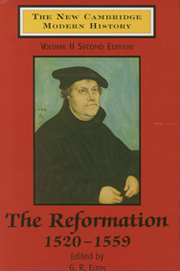Book contents
- Frontmatter
- Introduction to the second edition
- Chapter I The age of the Reformation
- Chapter II Economic change
- Chapter III The reformation movements in Germany
- Chapter IV The Reformation in Zurich, Strassburg and Geneva
- Chapter V The Anabaptists and the sects
- Chapter VI The Reformation in Scandinavia and the Baltic
- Chapter VII Politics and the institutionalisation of reform in Germany
- Chapter VIII Poland, Bohemia and Hungary
- Chapter IX The Reformation in France, 1515–1559
- Chapter X The Reformation in England
- Chapter XI Italy and the papacy
- Chapter XII The new orders
- Chapter XIII The empire of Charles V in Europe
- Chapter XIV The Habsburg–Valois wars
- Chapter XV Intellectual tendencies
- Chapter XVI Schools and universities
- Chapter XVII Constitutional development and political thought in western Europe
- Chapter XVIII Constitutional development and political thought in the Holy Roman Empire
- Chapter XIX Constitutional development and political thought in eastern Europe
- Chapter XX Armies, navies and the art of war
- Chapter XXI The Ottoman empire 1520–1566
- Chapter XXII Russia, 1462–1584
- Chapter XXIII The New World, 1521–1580
- Chapter XXIV Europe and the East
- Index
- References
Chapter IX - The Reformation in France, 1515–1559
Published online by Cambridge University Press: 28 March 2008
- Frontmatter
- Introduction to the second edition
- Chapter I The age of the Reformation
- Chapter II Economic change
- Chapter III The reformation movements in Germany
- Chapter IV The Reformation in Zurich, Strassburg and Geneva
- Chapter V The Anabaptists and the sects
- Chapter VI The Reformation in Scandinavia and the Baltic
- Chapter VII Politics and the institutionalisation of reform in Germany
- Chapter VIII Poland, Bohemia and Hungary
- Chapter IX The Reformation in France, 1515–1559
- Chapter X The Reformation in England
- Chapter XI Italy and the papacy
- Chapter XII The new orders
- Chapter XIII The empire of Charles V in Europe
- Chapter XIV The Habsburg–Valois wars
- Chapter XV Intellectual tendencies
- Chapter XVI Schools and universities
- Chapter XVII Constitutional development and political thought in western Europe
- Chapter XVIII Constitutional development and political thought in the Holy Roman Empire
- Chapter XIX Constitutional development and political thought in eastern Europe
- Chapter XX Armies, navies and the art of war
- Chapter XXI The Ottoman empire 1520–1566
- Chapter XXII Russia, 1462–1584
- Chapter XXIII The New World, 1521–1580
- Chapter XXIV Europe and the East
- Index
- References
Summary
For a full measure of the Protestant Reformation in France in the first half of the sixteenth century, we must look beyond the insurgence itself to the closing settlements. In their own way they marked a stage. After so much feuding and fanatic bigotry, the new men at the forefront of affairs came willingly or unwillingly to temper the righteousness of their cause with mingled feelings of chagrin, exhaustion, and uneasy compromise. The dynasty of Valois-Angoulême had faded and disappeared, leaving Henry of Navarre to claim the rich patrimony of the Crown. In a jaunty mood of elation he may well have said that Paris was worth a mass. Yet, when on 25 July 1593 before the archbishop of Bourges in the great church of Saint-Denis he abjured the tenets of his Protestant upbringing, the moment of truth and disillusionment was patently clear: France remained staunchly Catholic. He had to recognise that profound reality before validating his inheritance. For all the show of undeniable pugnacity, the Protestant cause could not reach beyond the posture of a minority. Its stance and conduct betrayed the very attitudes of a minority. All the more striking, therefore, was its success in carving out a niche of recognition in the structured life of France. Here lay one of the great dramas of early modern Europe and summed up a host of novelties, crises of conscience, deeply felt desires for reform as much by those who followed the path of revolt as by those who remained in or returned to the doctrines and traditions of Catholicism.
- Type
- Chapter
- Information
- The New Cambridge Modern History , pp. 223 - 261Publisher: Cambridge University PressPrint publication year: 1990



